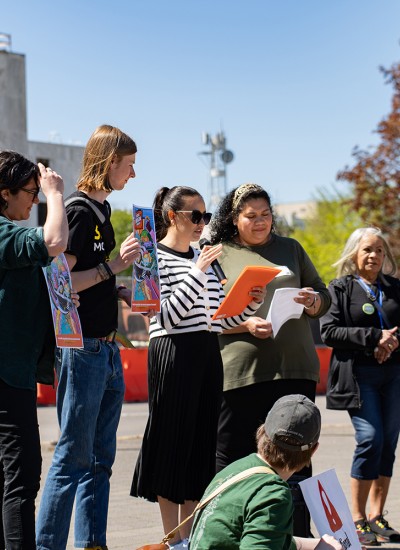By Krystal Eldridge | 3-minute read
Every eight years, transportation funding gets a front seat at the Oregon legislature, showing Oregonians where the state’s transportation priorities lie by putting dollars into programs and projects. Safe Routes to School, freeway megaprojects, free transit for youth, rail operations, multiuse paths, and a bevy of discrete taxes (some new, some familiar, some outdated) all get brought up for review alongside a long list of other funding wants or needs.
This is the year we set funding until the process repeats in 2033. We don’t yet have a bill draft, but the Joint Committee on Transportation has released a Transportation ReInvestment Package (TRIP) framework that gives the first real clues about the shape the legislation will take. Advocates like us, as part of the Move Oregon Forward coalition, are working toward a bill that not only helps Oregon communities have healthy, affordable, safe transportation options, but also is fair, sustainable, and accountable. Our statewide coalition rallied in Salem last Thursday to let legislators know Oregonians are unified in this call.
Here’s the mid-session transportation rundown.

What we’re fighting for
In the major transportation funding package – which should have a bill draft any day – we’re putting our weight behind solutions that address funding gaps for basic operations and maintenance, as well as oversubscribed active- and public-transportation grant programs.
“We need to pass a strong, forward-thinking transportation package right now. Without it, everyday costs will climb and communities will be left behind,” says Wilson.
Oregonians have asked for increases in public-transit investment, and the current TRIP framework lists transit as a key priority, including maintaining and expanding service, increasing access for youth and veterans, and expanding rural transit. All good things. But something is missing: enough funding. Right now, the proposed transit-tax increase won’t catch up with current needs (costs of service operations and improvements have gone up since the last package, in 2017), so we’re urging lawmakers to close this funding gap to prevent sharp cuts to current levels of transit service.
“We need to pass a strong, forward-thinking transportation package right now. Without it, everyday costs will climb and communities will be left behind,” says Cassie Wilson, our transportation policy manager. (Read more about the TRIP framework.)
We’re also working on passing free transit for anyone age 22 and younger in Oregon. Working in a coalition with Multnomah Youth Commission, Move Oregon Forward, Next Up Action Fund, and other groups, we’re pushing for the ultimate transportation package to expand existing free- and reduced-fare programs into a comprehensive statewide youth pass. Programs like this are crucial to creating a culture of transit ridership and also help connect young people to extracurriculars, jobs, apprenticeships, businesses, parks, and more.
Outside of the major funding package, we’re supporting key transportation bills that help communities access employment, education, daycare, shopping, healthcare, recreation, and more. That includes the Hood River–White Salmon bridge replacement, WES extension to Salem (and beyond), micromobility safety regulations, and creation of an Oregon Rail and Transit Department.

Where there’s room for improvement
The status quo – namely, freeway expansions, which induce more demand – isn’t working, but that’s what we got with HB 2017, the last major transportation package, and this year’s bill appears set to invest in those same megaprojects. And we mean those same projects, with $250 million per biennium from the system-use fee going toward completion of previous commitments. Those large-scale projects heavily invest in the Portland metro area at the expense of the rest of the state.
The TRIP framework is also slim on accountability and transparency, a key ask of the Move Oregon Forward campaign. But we’re hopeful that the first bill draft will clearly outline where Oregonians’ tax dollars will go and ensure that ODOT can afford any new projects it puts forward. “We appreciate seeing so many of our values for Oregon’s transportation future named in the package outline. Now is the time to ensure the money matches the mission,” says Wilson. Right now, Oregonians lack access to any clear public record of how ODOT spends its money.
So far the bill to kill is the “zombie bridge” through Sauvie Island, a vestige of the very dead westside bypass. The bill makes no practical sense – another unaffordable megaproject, this one across irreplaceable farmland and needing buy-in from Washington State to complete the connection to I-5. (Learn more.)
What’s next
On Thursday, April 24, we’re hosting a mid-session legislative update event exclusively for our members and entirely focused on transportation. Membership starts at $35 a year and comes with a host of other perks. If you’re a current member, check your inbox for the registration link. If you’re thinking of becoming a member in order to join the event, we’d love to have you – just make sure you email us to let us know.
